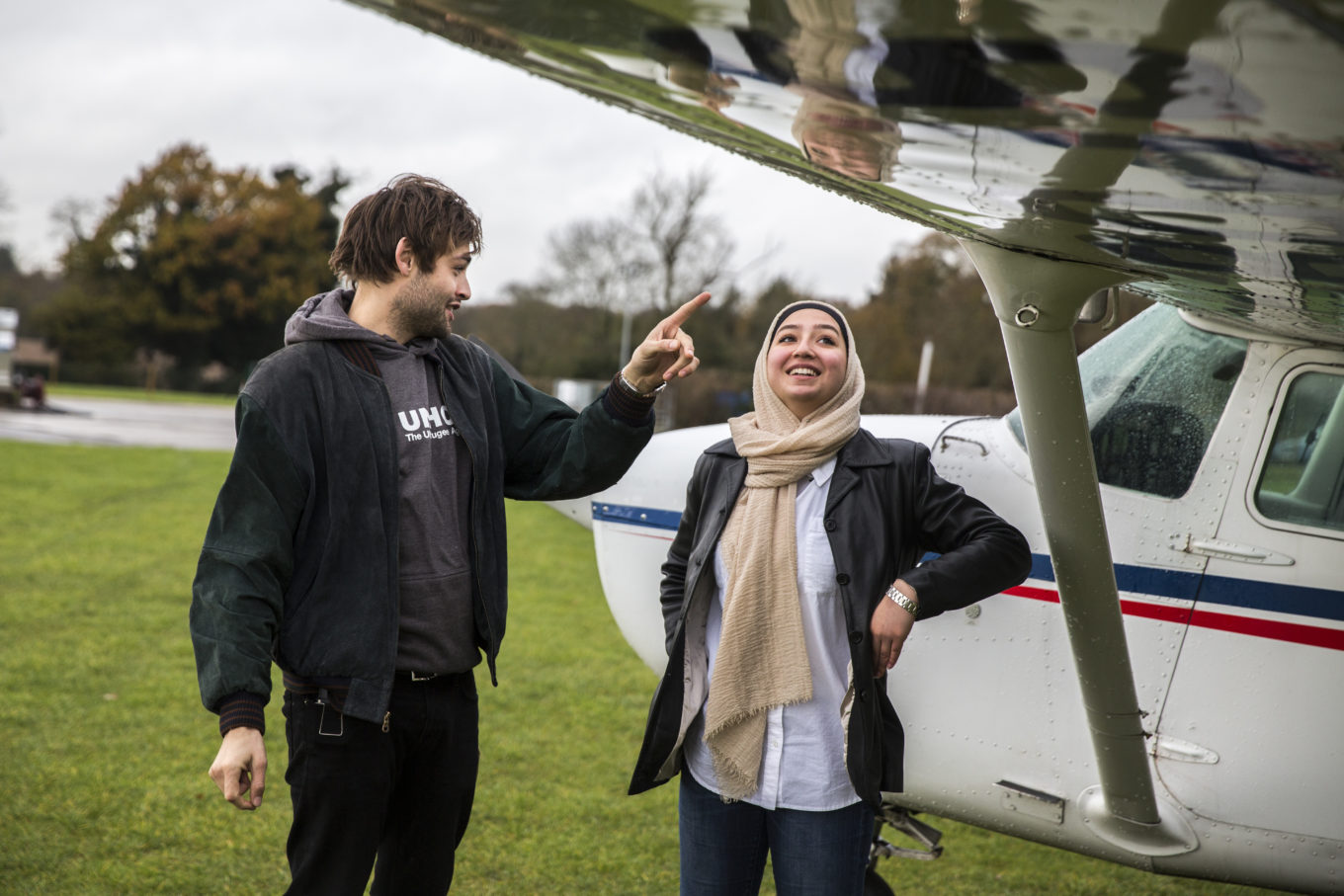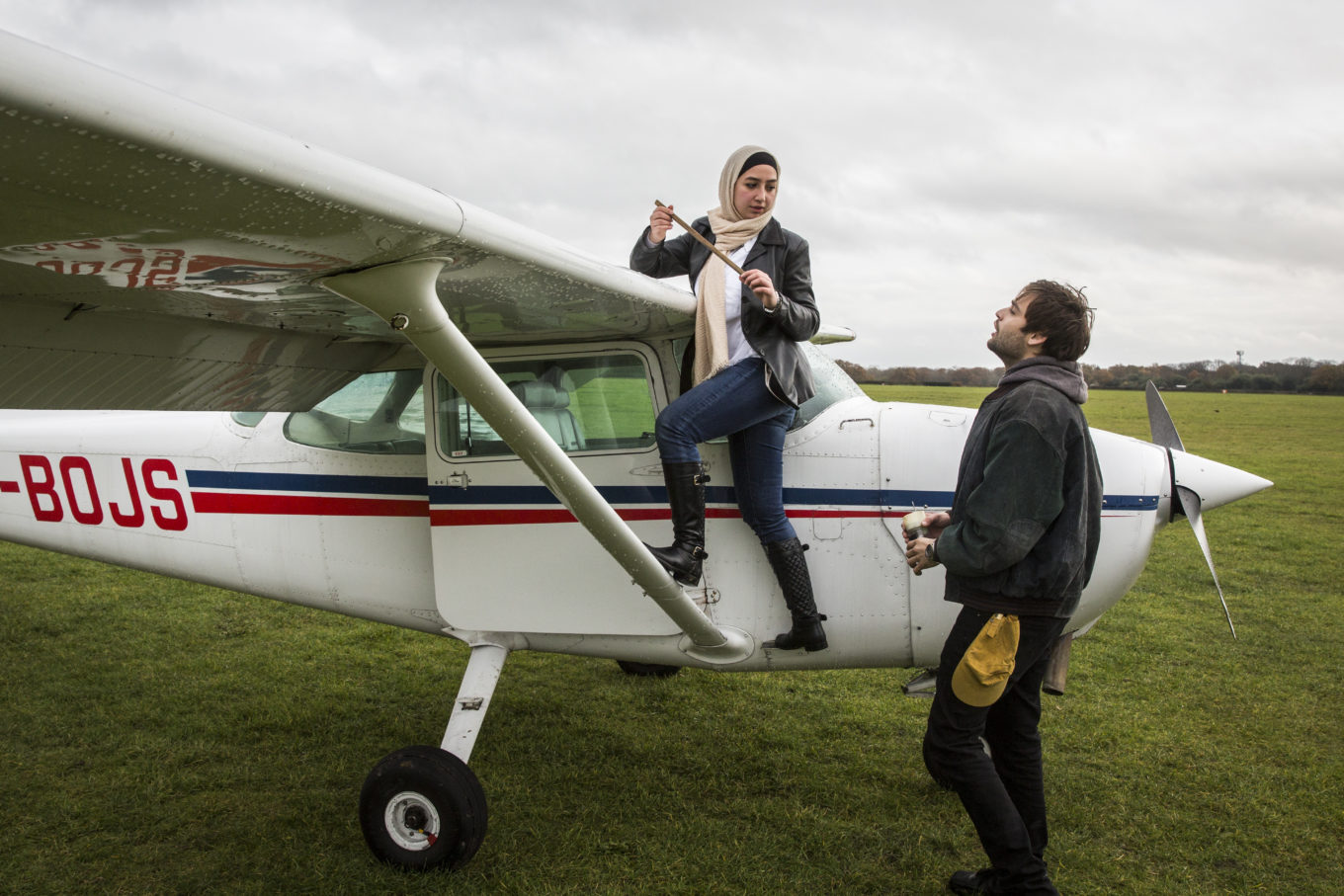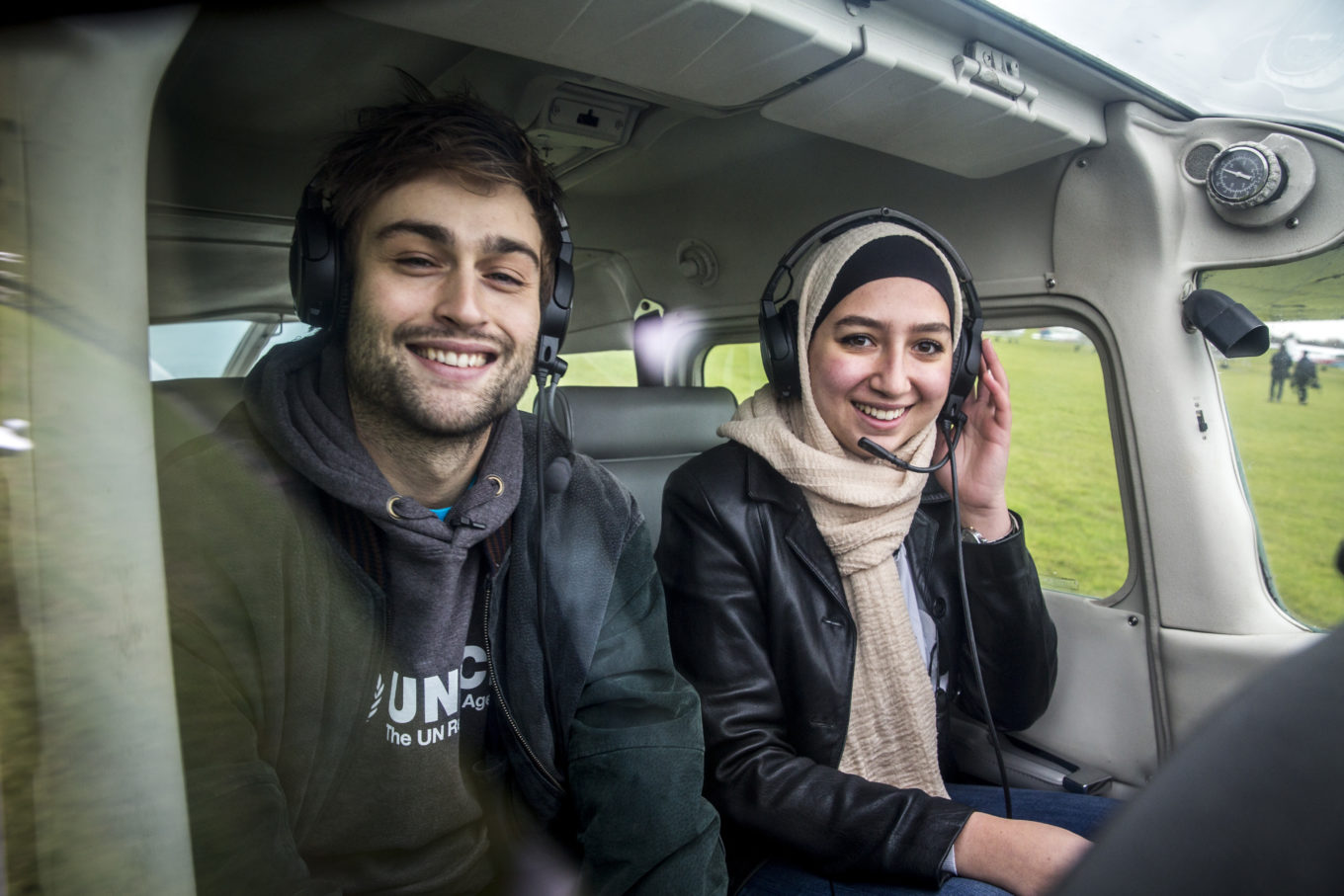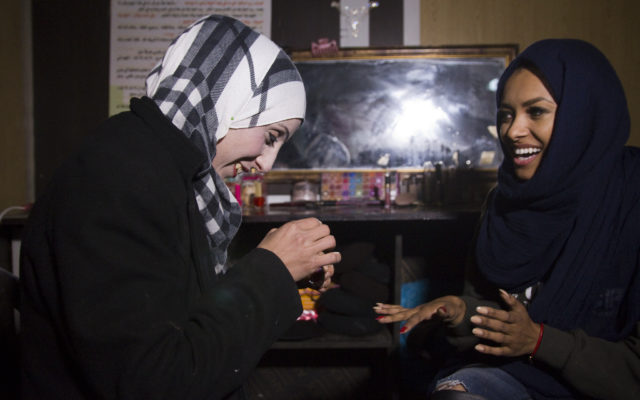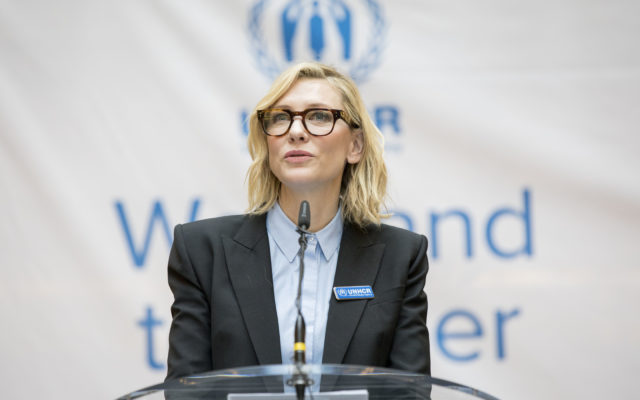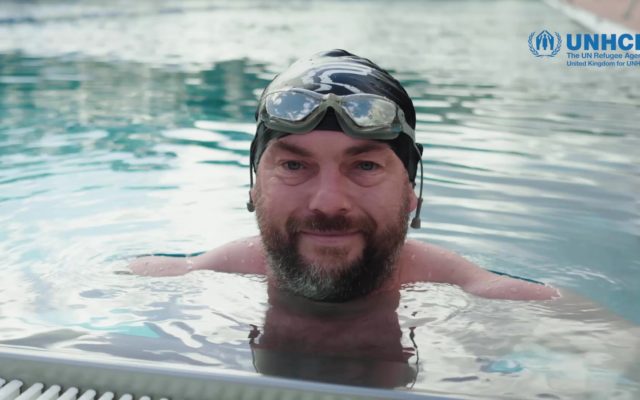Aiming Higher with Maya Ghazal and Douglas Booth
At a refugee solidarity event hosted by our partner WeWork, Maya and Douglas discuss how education is a lifeline for so many young refugees. With only 3% of refugees currently accessing higher education, UNHCR is campaigning to turn this around and create more enrolment opportunities.
©UNHCR/Andrew McConnell
In November 2019, UNHCR High Profile Supporter and actor Douglas Booth was a passenger in a four-seater airplane piloted by fellow UNHCR High Profile Supporter, Syrian refugee and TedX Speaker, Maya Ghazal.
“I went on Maya’s last flight with an instructor before she flew solo for the first time. I’m not great with heights. I’m not great with flying full stop, even when I’m on a Boeing 747. With Maya, I felt okay. I felt in very good hands.”
As UNHCR supporters for several years both Douglas and Maya are fierce advocates for those forced to flee. Maya fled Damascus in 2017, traveling to the UK under a family reunification scheme. She arrived speaking no English and despite her experience, knowledge and ambition she struggled to get a place in secondary school.
She overcame the language barrier by teaching herself English, and she fought hard against the stereotyping she experienced of refugees being uneducated or somehow not capable. Eventually Maya persuaded a school to enrol her, and with hard work, great determination, and the hope of achieving a better future, Maya secured a place at Brunel University in London where she is currently studying aviation engineering.
Maya’s story is just one of countless examples of refugee students having their education interrupted, threatening their ability to reach their full potential. It is why UK for UNHCR and our partner WeWork, spoke to Maya and Douglas about how access to education can be a lifeline for refugees. Moderated by Rohan Shiram, WeWork’s Director of Social Impact, Sustainability and Energy, UNHCR’s education expert Manal Stulgatis spoke to the supporters about how education gives refugees the key to help rebuild their lives:
Rohan: Douglas, you have travelled to Iraq, Italy and Greece with UNHCR. I wonder if you could tell us a bit about that and some of the people you’ve met?
Douglas: In 2015, just after I first started working with UNHCR, I visited the island of Lesvos in Greece. I was really struck by a particular group of young guys that I met – all around my own age at the time. These guys were living in diabolical conditions having left their families behind to flee Syria due to the threat of being forced to fight on the frontlines. They had all been students at university in Aleppo, had all been on a path to getting degrees in Engineering or Medicine and suddenly they had to put their dreams and futures on hold in order to survive. They had sold everything – including their laptops with all of their university work – in order to take an extremely dangerous journey to try and find safety and the hope of completing their studies.
I’ve always been dyslexic, I always struggled at school. I never liked it that much. But until I spoke to those guys, I’m not sure I ever really appreciated what a privilege it was to have access to education in the UK.
She overcame the language barrier by teaching herself English, and she fought hard against the stereotyping she experienced of refugees being uneducated or somehow not capable.
Maya: When I first arrived in the UK, I was 16-years-old. We always appreciated how important education was back in Syria because we used to have days where we wouldn’t be able to get to school because of the conflict. I had to change schools three times, either because the school would be surrounded by an army or it would be too dangerous to access.
At the point we left Syria, the security situation was getting worse and worse, and day-to-day necessities such as gas and electricity were hard to get. Food prices were getting higher and higher and people couldn’t afford to live normally.
When everybody told me that I couldn’t become a pilot, I decided that is exactly what I wanted to do.
Arriving in the UK, I was very excited to start school, to meet new people and to acclimatise to this new life. But then I was hit by rejections from different schools. I was told that I was not good enough to sit in the classroom with people my age. They wouldn’t even test my potential or ask me to take an exam, even though I told them I wanted to get tested to just check my knowledge. Although my English was not great, my knowledge of social sciences, physics, and maths was not limited by language.
When I arrived, I really wanted to become a political scientist and study international politics because I was very eager to present a good image of my country. Being told that I wasn’t good enough for school really crushed my dreams and made me feel like I couldn’t proceed with my life.
That’s when it hit me that I was starting my life from zero in a new place. I couldn’t speak the language of the people around me. I knew I had to work really hard on myself and work hard on teaching myself English because I knew if I wanted to see change, if I wanted to tell people, “I have potential”, I needed to get that education and prove those people wrong.
Later on, I became fascinated by airplanes – these amazing, big machines – and I wanted to control them. When everybody told me that I couldn’t become a pilot, I decided that is exactly what I wanted to do. I wanted to tell them that I would become the first-ever female Syrian refugee pilot. It’s a dream that I worked towards every day. And I’ve now got my private pilot’s license.
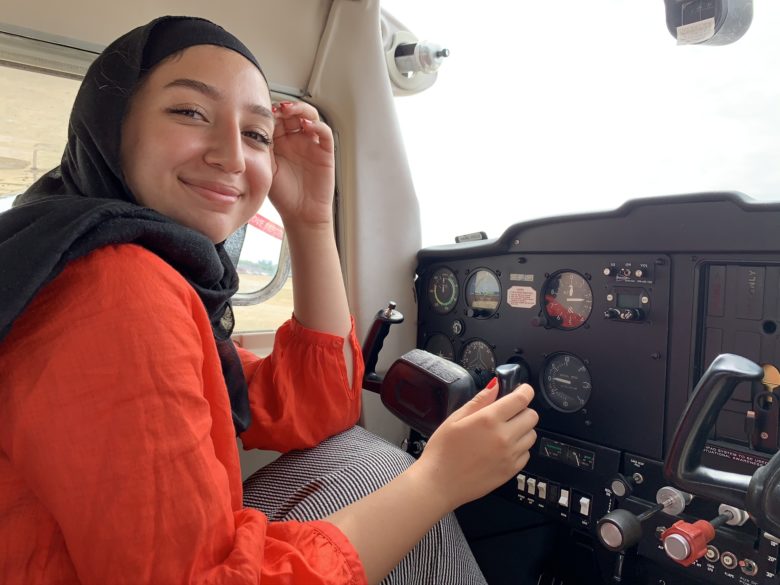
But that doesn’t mean that’s the end of my journey. I’m very excited for what is still to come, especially with my education. This year, I’m going to graduate with my bachelor’s degree. Next year, I’ve decided that I’m going to do my master’s degree.
——————————————————————-
WeWork and UK for UNHCR are raising funds to help more young refugees like Maya. Join us by donating today and together we can reach our target of £10,000. This will mean that we can help four refugee students enrol in their first year of higher education.


